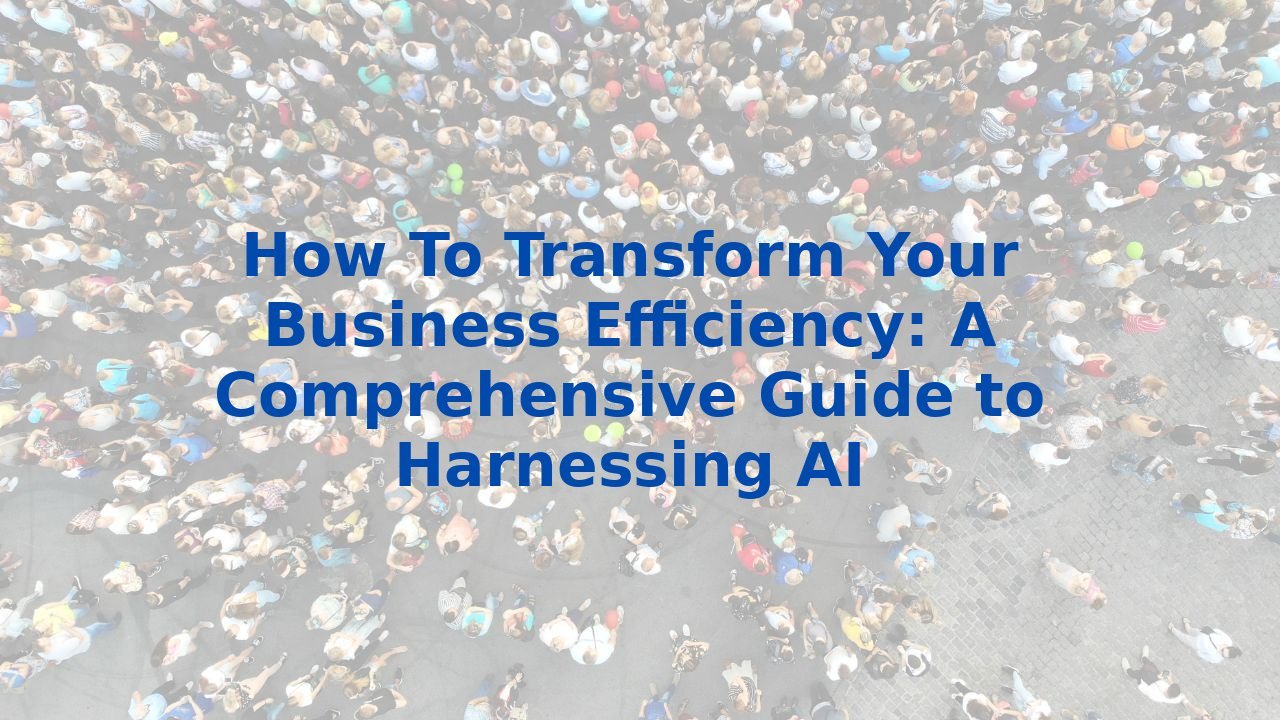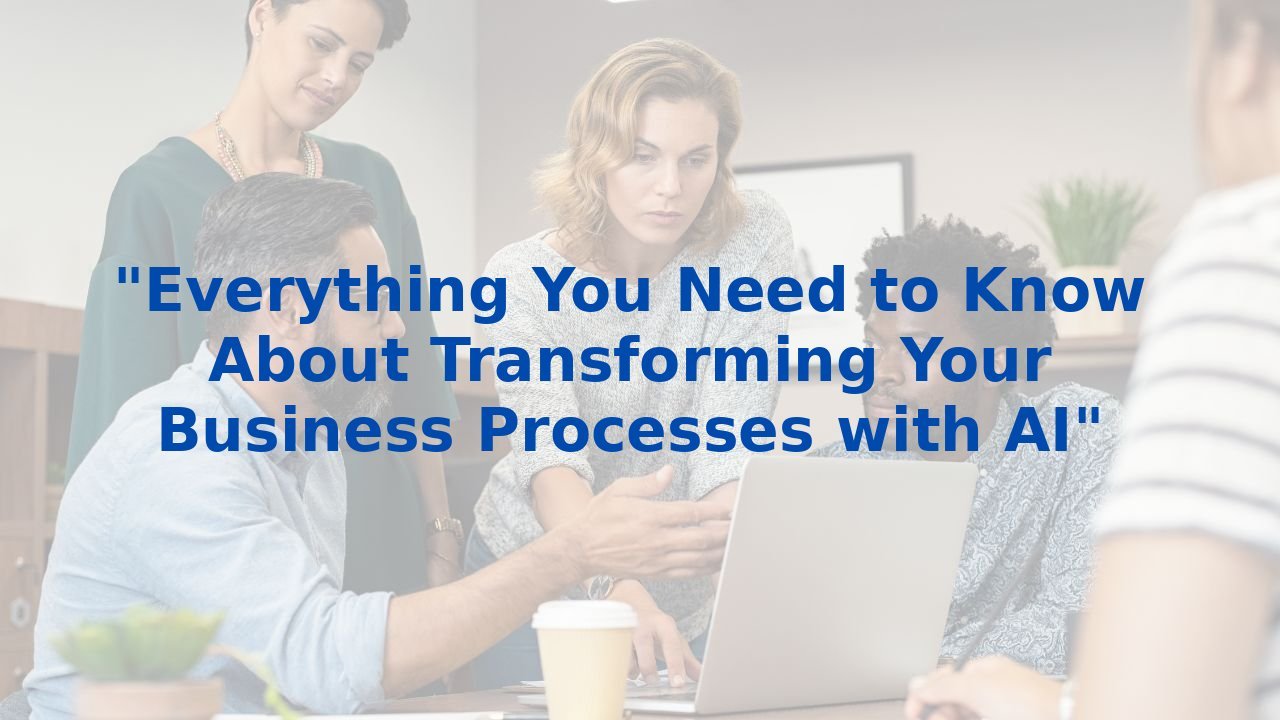How To Transform Your Business Efficiency: A Comprehensive Guide to Harnessing AI
Enhancing Business Efficiency with AI: A Comprehensive Guide
Introduction
In today's fast-paced business environment, efficiency isn't just an advantage; it's a necessity for survival. Enter artificial intelligence (AI), a revolutionary force that can redefine how businesses operate. By optimizing processes, improving productivity, and enhancing decision-making, AI stands out as the game-changer that every organization must embrace. This article explores how AI can transform your business processes and outlines the benefits of integrating AI into your organizational strategy.
Understanding AI Process Optimization
At its core, AI process optimization uses advanced technologies such as machine learning and natural language processing to refine business operations. This process involves meticulous analysis of data, streamlining repetitive tasks, and enabling smarter decision-making. The ultimate goal? To reduce errors, supercharge productivity, and heighten operational effectiveness. As organizations stand on the brink of this revolution, it's essential to recognize how AI can take them to the next level.
Key Benefits of AI in Business Process Management
1. Process Discovery and Mapping
AI can dive deep into an organization’s existing processes, utilizing process mining and pattern recognition to create accurate, real-time process maps. This clutter-free snapshot allows businesses to visualize their workflows, ensuring that essential documentation is always up-to-date and reflective of current operations.
2. Process Automation
Imagine a world where routine tasks are completed without human intervention. That's the power of AI bots. From intelligent document processing to robotic process automation, AI handles high-volume tasks with unparalleled efficiency, liberating employees to focus on more strategic initiatives.
3. Process Management and Improvement
AI is not just a set-it-and-forget-it solution; it continuously monitors processes, leveraging historical data to provide actionable insights. With its proactive capabilities, companies can identify potential issues before they escalate, enabling sustainable improvements that evolve alongside the business itself.
4. Enhanced Decision-Making
The decision-making landscape is often fraught with complexity. However, AI simplifies this by processing vast amounts of structured and unstructured data, providing leaders with essential insights and predictive modeling. By grounding their choices in data-driven evidence, organizations can mitigate risks and seize opportunities with confidence.
5. Real-Time Monitoring and Risk Prediction
AI-driven process mining doesn't just provide historical insights; it enables real-time status updates on ongoing processes. This capability allows businesses to react swiftly to emerging challenges or opportunities, enhancing their agility in an ever-changing landscape.
Practical Applications of AI in Business Processes
1. Document Processing
Intelligent document processing harnesses AI to swiftly convert a mountain of paperwork into usable data. This innovation significantly decreases the potential for errors while freeing up precious time—essentially rewriting the rulebook on data management.
2. Customer Service
AI revolutionizes customer interactions by analyzing feedback and employing chatbots that address routine inquiries efficiently. This allows human teams to focus on complex customer needs, greatly improving the overall customer experience.
3. Supply Chain Management
Through real-time data analysis, AI can detect anomalies and alert supply chain managers about potential issues before they escalate. For organizations, this means not just being reactive but also proactive—positioning them for greater success.
4. Sales and Marketing
AI enhances sales processes by streamlining operations and offering personalized recommendations, ensuring that interactions resonate with prospects. From optimizing outreach strategies to crafting compelling communication, AI paves the way for refined and effective sales journeys.
Training Employees for AI
Adopting AI is only one part of the equation; ensuring your team feels comfortable wielding AI technologies is equally vital. Effective training programs are imperative for organizations looking to reap the full benefits of AI.
1. Understanding AI Capabilities
Employees must grasp what AI can do—alongside its limitations. This knowledge equips them to know when to rely on AI and when human intuition is crucial.
2. Data Analysis Skills
Proficiency in data analysis is essential, enabling employees to interpret AI-generated insights effectively. Their ability to visualize and draw conclusions from complex datasets can significantly drive decision-making.
3. Collaboration and Communication
AI is merely a tool; effective human collaboration with AI systems is what drives results. Training should emphasize communication strategies to integrate AI insights into everyday operations smoothly.
4. Continuous Learning
The AI landscape is ever-evolving, making continuous learning imperative. Organizations must cultivate a culture where employees feel encouraged to expand their knowledge and stay ahead of the curve.
Conclusion
Integrating AI into business processes offers a myriad of benefits—transforming everything from routine task automation to strategic decision-making. By capitalizing on AI capabilities in process discovery, management, and continuous improvement, organizations can markedly enhance their efficiency and effectiveness. Moreover, investing in employee training ensures that teams are not just users but adept partners in the AI revolution. This synergy fosters a culture of innovation, unlocking profound potential for sustainable growth and long-term success.
As we navigate this transformative era, one thing is clear: the intersection of AI technology and human talent will define the future of business.



